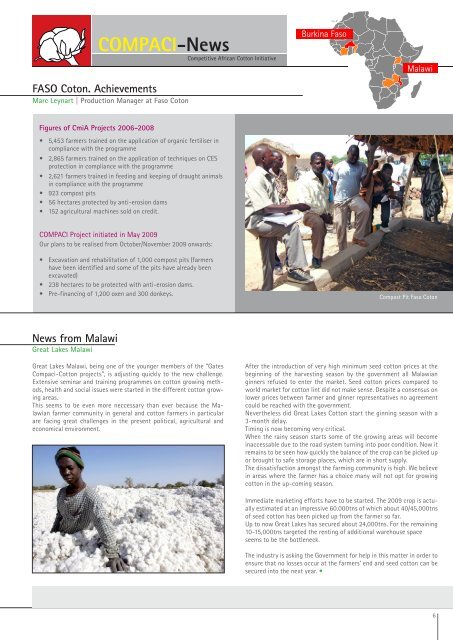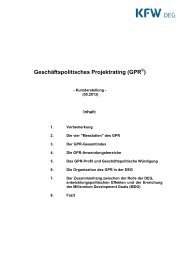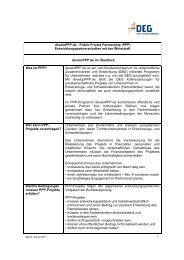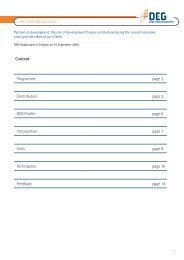Create successful ePaper yourself
Turn your PDF publications into a flip-book with our unique Google optimized e-Paper software.
FASO Coton. Achievements<br />
<strong>COMPACI</strong>-<strong>News</strong><br />
Competitive African Cotton Initiative<br />
Marc Leynart | Production Manager at Faso Coton<br />
Figures of CmiA Projects 2006-2008<br />
• 5,453 farmers trained on the application of organic fertiliser in<br />
compliance with the programme<br />
• 2,865 farmers trained on the application of techniques on CES<br />
protection in compliance with the programme<br />
• 2,621 farmers trained in feeding and keeping of draught animals<br />
in compliance with the programme<br />
• 923 compost pits<br />
• 56 hectares protected by anti-erosion dams<br />
• 152 agricultural machines sold on credit.<br />
<strong>COMPACI</strong> Project initiated in May 2009<br />
Our plans to be realised from October/November 2009 onwards:<br />
• Excavation and rehabilitation of 1,000 compost pits (farmers<br />
have been identified and some of the pits have already been<br />
excavated)<br />
• 238 hectares to be protected with anti-erosion dams.<br />
• Pre-financing of 1,200 oxen and 300 donkeys.<br />
<strong>News</strong> from Malawi<br />
Great Lakes Malawi<br />
Great Lakes Malawi, being one of the younger members of the “Gates<br />
Compaci-Cotton projects”, is adjusting quickly to the new challenge.<br />
Extensive seminar and training programmes on cotton growing methods,<br />
health and social issues were started in the different cotton growing<br />
areas.<br />
This seems to be even more neccessary than ever because the Malawian<br />
farmer community in general and cotton farmers in particular<br />
are facing great challenges in the present political, agricultural and<br />
economical environment.<br />
Burkina Faso<br />
Malawi<br />
Compost Pit Faso Coton<br />
After the introduction of very high minimum seed cotton prices at the<br />
beginning of the harvesting season by the government all Malawian<br />
ginners refused to enter the market. Seed cotton prices compared to<br />
world market for cotton lint did not make sense. Despite a consensus on<br />
lower prices between farmer and ginner representatives no agreement<br />
could be reached with the government.<br />
Nevertheless did Great Lakes Cotton start the ginning season with a<br />
3-month delay.<br />
Timing is now becoming very critical.<br />
When the rainy season starts some of the growing areas will become<br />
inaccessable due to the road system turning into poor condition. Now it<br />
remains to be seen how quickly the balance of the crop can be picked up<br />
or brought to safe storage places, which are in short supply.<br />
The dissatisfaction amongst the farming community is high. We believe<br />
in areas where the farmer has a choice many will not opt for growing<br />
cotton in the up-coming season.<br />
Immediate marketing efforts have to be started. The 2009 crop is actually<br />
estimated at an impressive 60.000tns of which about 40/45,000tns<br />
of seed cotton has been picked up from the farmer so far.<br />
Up to now Great Lakes has secured about 24,000tns. For the remaining<br />
10-15,000tns targeted the renting of additional warehouse space<br />
seems to be the bottleneck.<br />
The industry is asking the Government for help in this matter in order to<br />
ensure that no losses occur at the farmers’ end and seed cotton can be<br />
secured into the next year. •<br />
6







